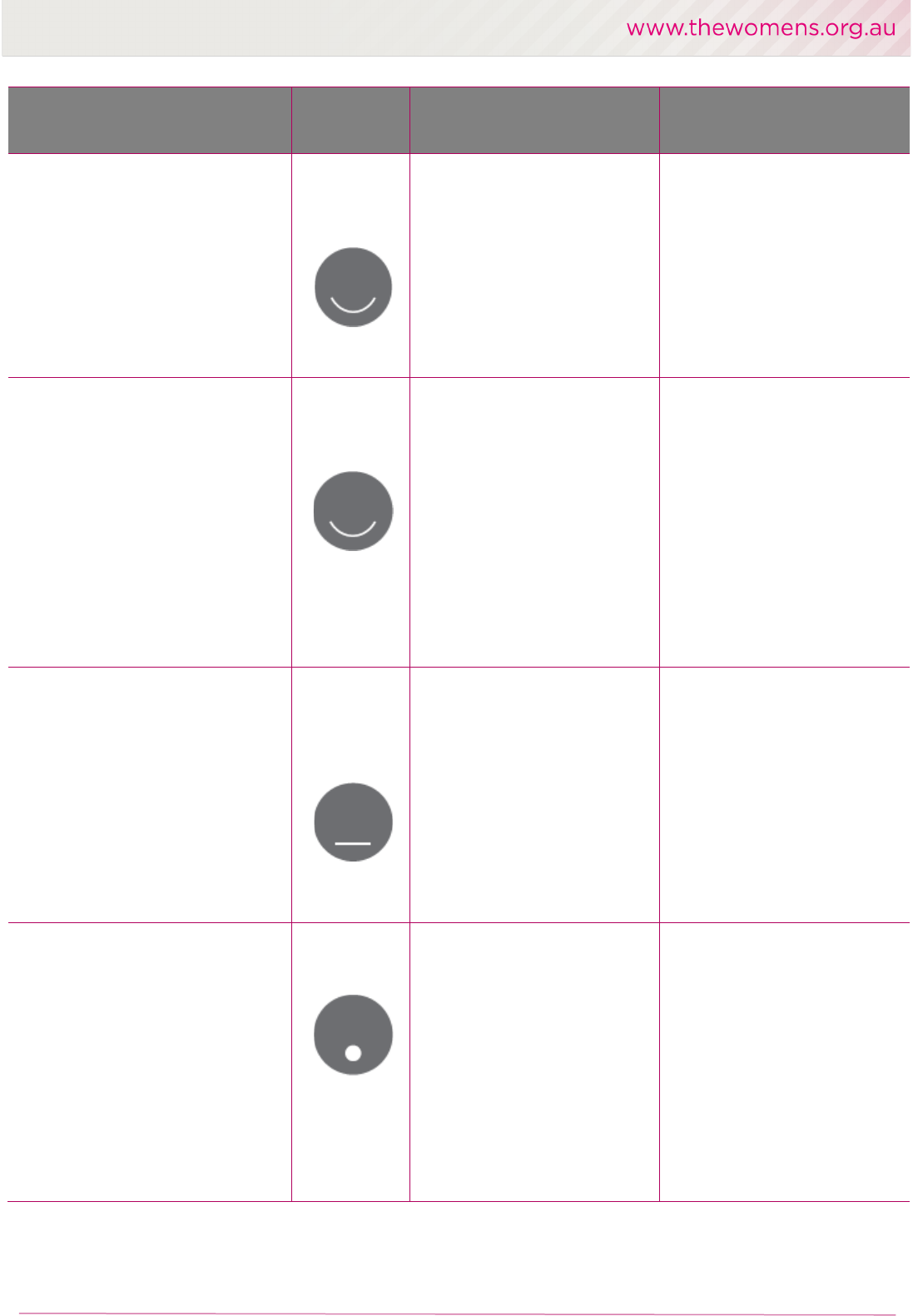
WHEN TO CALL THE HOSPITAL – APRIL 2019 PAGE 1 OF 2
Sometimes during late pregnancy, changes may occur that can concern some women.
Many of these concerns can be raised and discussed at your clinic appointment,
however some should be discussed with a midwife as soon as possible.
When should I call the hospital?
You should contact the hospital if you
experience any of the following symptoms:
•
If your waters break (this may occur before
or after labour contractions begin).
•
If you have vaginal bleeding that is not
mixed with mucous. Vaginal bleeding with
lots of mucous is called a ‘show’ and is a
sign that labour is progressing normally.
You can also get a ‘show’ if you have had a
vaginal examination during your admission.
•
If the contractions are regular, last more
than 30 seconds and are closer than
5 minutes apart.
•
If you are frightened or unsure about what is
happening.
•
If you need drugs for pain management.
•
If you do not feel your baby moving.
Who should I call?
To speak with a midwife at the hospital about any
of these concerns, you should call:
•
(03) 8345 3635 (Parkville patients)
•
(03) 9076 1245 (Sandringham patients)
Do not call these number for general enquiries.
Am I in labour?
It is not unusual for some women to have
more than one admission before labour is fully
established, especially if this is your first baby.
Sometimes early labour is called the latent
phase of labour, or pre-labour. If you are
having a baby for the first time, pre-labour may
last for a few hours, days or weeks.
The irregular contractions that you may feel
during this time are making your cervix (the
neck of the womb) soften and thin out, ready
to open further. Most women experience
contractions as similar to intermittent period
pains.
When should I come to hospital?
Research tells us that for well, full term women
and babies, the best place to spend this phase
of labour is at home. ‘Well, full term’ means
that your pregnancy is more than 37 weeks’
gestation and you and your baby are well.
If you have been given any different
information related to your individual
circumstances, please follow those specific
instructions.
At home, you have the freedom of your own
surroundings. You can eat, sleep and move
around at your own pace.
Listen to your body and do what you
instinctively feel is right for you. Remember
that your experience is uniquely yours.
WHEN TO CALL THE HOSPITAL
ADVICE FOR WOMEN IN LATE PREGNANCY

DISCLAIMER This factsheet provides general information only. For specific advice about your baby or your healthcare needs, you should seek advice from your health professional.
The Royal Women’s Hospital does not accept any responsibility for loss or damage arising from your reliance on this factsheet instead of seeing a health professional. If you or your
baby require urgent medical attention, please contact your nearest emergency department. © The Royal Women’s Hospital 2017
WHEN TO CALL THE HOSPITAL – APRIL 2019 PAGE 2 OF 2
STAGE/PHASE OF LABOUR
FEELINGS
HAPPENINGS
HELPFUL IDEAS
Pre-labour
Cervix starting to thin
Irregular mild, short contractions
May last a few days
Excited,
apprehensive
Mucous tinged with blood
Backache
Lower abdominal pain (like
period pain)
Sometimes diarrhoea
Sometimes waters break
You may feel tired
Life as normal
Move around, keep busy
Rest if you need to
1st stage: early phase (8-16hrs)
Cervix 0–4cm dilated (open)
Contractions are regular, 5–20
mins apart, lasting 20–40 seconds
Excited,
apprehensive
You may feel tired
Mucous tinged with blood
Backache
Lower abdominal pain (like
period pain)
Sometimes diarrhoea
Sometimes waters break
Keep eating and drinking
(small amounts often)
Move around, keep busy
Rest if you need to
Empty your bladder every two
hours
Time your contractions (from
start of one to start of the
next)
Call the hospital
1st stage: active phase (3-5hrs)
Cervix 4–8cm dilated
Contractions are 3–7 mins apart,
lasting 50–60 seconds
Becoming
weary,
restless
Contractions, strong and
regular
Intense, lower abdominal pain
Backache may continue
Totally focused on labour
Dependent on support people
Blood tinged mucous
Waters may break
Use deep breathing
Focus
Take a hot shower or use hot
packs
Change positions
Rest between contractions
Sip fluids/suck sweets
2nd stage: pushing (1/2-2 hrs)
Cervix fully dilated (10cm)
Contractions 2–5 mins apart,
lasting 60–90 seconds
Working hard
Contractions space out
Pain is less intense, more
pressure
Strong urge to push
Stretching, burning as baby’s
head moves down
Push with contractions (use a
mirror)
Rest between contractions
Cool flannel or spray to face
and neck
Listen to support people.
You may need to pant through
the strong urge to push to
slow down the birth of the
baby’s head
